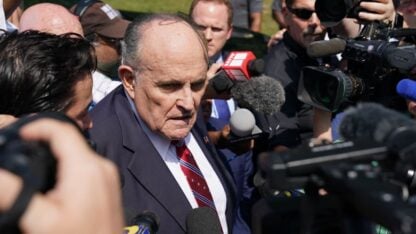During multiple campaign stops in Georgia, Republican presidential candidate Rick Santorum has strongly advocated the use of health savings accounts.
However, experts still debate whether the accounts are effective.
Speaking at a campaign rally in north Altanta last week, the former Pennsylvania Senator continued to use healthcare to paint a strong contrast between himself and the rest of the field.
“I’m unique in this race of the three people that have won states – the only one who never supported government mandates,” said Santorum. “I came about it from the completely opposite direction. I came about it with a program called health savings accounts. I was out there leading the charge.”
Given Georgia’s support for health savings accounts in the past, Santorum’s strategy may be a wise one.
HSAs were created by federal law in 2003. They aimed to empower consumers to take more control over their health costs.
“What HSAs offered was an opportunity for individuals to carry over funds from year-to-year on a tax free basis,” said Wayne Oliver of the Georgia-based Center for Health Transformation.
He says HSAs, coupled with high deductible plans, serve to lower premiums and increase out-of-pocket costs.
In 2007, with strong support from Oliver’s organization, Georgia lawmakers passed a series of tax breaks to encourage the use of HSAs.
“We here in Georgia attempted to embrace the idea that rewards and incentives could be utilized to change behavior,” said Oliver. “That every time I have a headache I don’t go into the emergency room, that I am otherwise incented to make appropriate and wise decisions about my healthcare.”
When the tax breaks were passed, Oliver’s organization predicted they would help reduce Georgia’s uninsured population by 500,000.
But according to recent data, those tax breaks have had little effect. Georgia’s uninsured rate has actually gone up by a faster rate than any other Southern state.
Tim Sweeney of the Georgia Budget & Policy Institute isn’t surprised. He says the majority of Georgia’s 1.9 million uninsured are low-income and HSA’s, even with tax breaks, don’t do enough to address affordability issues.
“The high deductible health plan and the health savings account doesn’t really get at those issues because even if the premium is lower, you’re looking at a $1200 or more individual deductible and folks at lower income levels won’t be able to afford to use their plan.”
Wayne Oliver counters that because of the sluggish economy, it’s too early to make any conclusions about Georgia’s HSA tax breaks. But he is confident HSAs remain one of the best tools to control costs and improve market transparency.
“We have to create the opportunity for those plans to come into the market so that we have more choices, not less, so that we have more information to make informed decisions,” said Oliver.
In any event, Santorum continues to make the case that his consistent support of HSAs makes him the best candidate to face President Obama in November.
Georgia voters will decide tomorrow.
Related Links:
9(MDAxODM0MDY4MDEyMTY4NDA3MzI3YjkzMw004))








